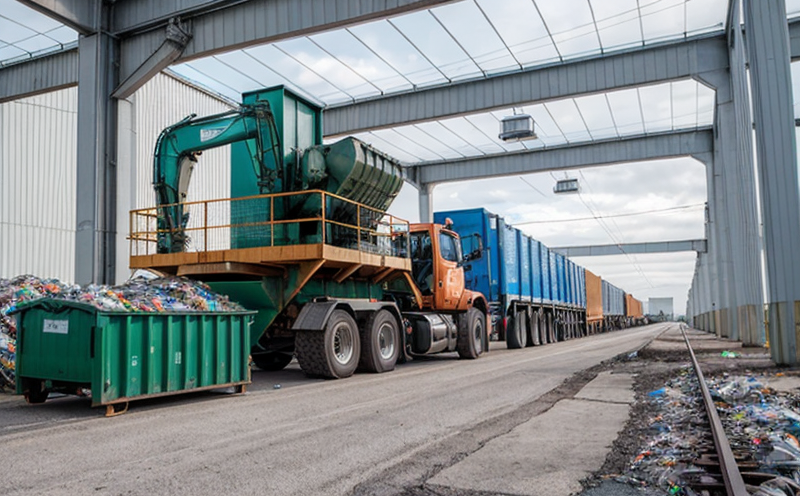ISO 24416 Waste Electrical and Electronic Equipment WEEE Recycling Testing
The ISO 24416 standard provides a framework for recycling waste electrical and electronic equipment (WEEE) in an environmentally responsible manner. This service ensures compliance with international standards, supporting sustainability goals while ensuring the safe handling and processing of end-of-life electronics.
Our testing adheres to the ISO 24416:2017 standard, which specifies requirements for the recycling process of WEEE products. Compliance is crucial for manufacturing plants that handle electronic waste, as it ensures adherence to environmental regulations and promotes sustainable practices.
The test parameters involve several key aspects including material recovery rates, energy efficiency during processing, emissions control, and the use of environmentally friendly solvents. Specimen preparation typically involves sorting and categorizing WEEE into various types such as plastics, metals, glass, and other materials for effective recycling.
Our state-of-the-art laboratory uses advanced instrumentation like X-ray fluorescence analyzers (XRF) and gas chromatography-mass spectrometry (GC-MS) to analyze the composition of recycled materials. Reporting is comprehensive, detailing material recovery rates, energy consumption during processing, emissions produced, and the use of sustainable practices.
For quality managers, compliance officers, R&D engineers, and procurement specialists, this service provides critical insights into recycling processes. It ensures that manufacturing plants are meeting environmental standards set by ISO 24416 while optimizing resource recovery and reducing waste.
| Test Parameter | Description |
|---|---|
| Material Recovery Rate | The percentage of materials recovered from WEEE during the recycling process. |
| Emissions Control | Monitoring and control measures for reducing harmful emissions during recycling processes. |
| Energy Efficiency | Analysis of energy consumption in the recycling process to ensure it is as efficient as possible. |
| Sustainable Practices | Evaluation of methods used to minimize environmental impact, such as the use of biodegradable solvents. |
The testing procedure involves several steps: initial material sorting and categorization, processing according to specified ISO 24416 guidelines, analysis using advanced equipment, and comprehensive reporting. This ensures that manufacturing plants can achieve high levels of recycling efficiency while adhering to strict environmental standards.
By providing this service, we support the circular economy by facilitating the responsible handling and processing of electronic waste. Our testing helps ensure that recycled materials are safe for reintegration into new products, thereby promoting sustainable production practices.
Industry Applications
- Manufacturing plants dealing with end-of-life electronics.
- Recycling facilities specializing in the recovery of WEEE.
- Companies involved in the refurbishment and remanufacture of electronic products.
| Application | Description |
|---|---|
| Manufacturing Plants | Ensures compliance with ISO 24416, supporting sustainable production practices and minimizing environmental impact. |
| Recycling Facilities | Provides data for optimizing recycling processes to meet stringent environmental regulations. |
| Refurbishment Companies | Aids in the safe handling of WEEE during refurbishment, ensuring compliance with international standards. |
These applications are crucial for industries focused on reducing waste and promoting a circular economy. Our testing supports these efforts by providing accurate and detailed information about recycling processes, helping manufacturers and recyclers meet environmental goals.
Eurolab Advantages
At Eurolab, we offer unparalleled expertise in industrial manufacturing and processing testing, particularly in the realm of WEEE recycling. Our team of specialists ensures that every test is conducted with precision and accuracy, providing reliable data for your compliance needs.
We leverage cutting-edge technology to perform ISO 24416 tests, ensuring that our clients receive the most up-to-date information on their recycling processes. Our advanced instrumentation allows us to analyze materials in ways that are both precise and environmentally friendly.
Our commitment to sustainability is reflected in every aspect of our testing process. We use only the latest technologies and methodologies, ensuring that your compliance efforts are as efficient and effective as possible. Whether you're a quality manager, compliance officer, R&D engineer, or procurement specialist, Eurolab offers the expertise and support you need to meet ISO 24416 standards.
Our testing services go beyond just providing data; they offer actionable insights that can help your organization optimize its recycling processes. By partnering with us, you gain access to a team of experts who understand the complexities of WEEE recycling and are dedicated to helping you achieve sustainable production practices.
Environmental and Sustainability Contributions
The ISO 24416 standard plays a vital role in promoting environmental sustainability by ensuring that waste electrical and electronic equipment is recycled in an environmentally responsible manner. By adhering to this standard, manufacturing plants can significantly reduce their environmental footprint while contributing to the circular economy.
Our testing services support these efforts by providing detailed insights into recycling processes, helping manufacturers identify areas for improvement and implement best practices. This not only enhances sustainability but also ensures compliance with international regulations.
The benefits of adhering to ISO 24416 extend beyond environmental impact. By optimizing recycling processes, companies can reduce costs associated with waste disposal and improve resource recovery rates. This leads to more efficient production processes and a reduced carbon footprint.
At Eurolab, we are committed to supporting the circular economy by offering comprehensive testing services that help businesses meet ISO 24416 standards. Our expertise in this area ensures that your organization can achieve sustainable production practices while complying with international regulations.





